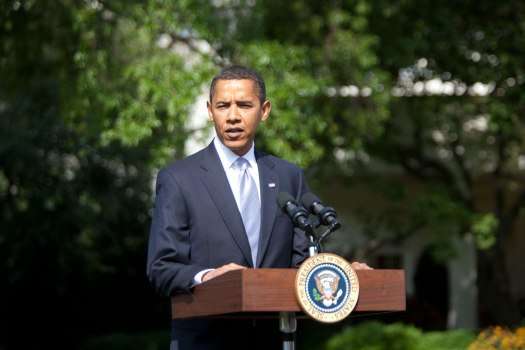Obama Relies on False Hope to Sell Obamacare
Even the statement that consumers can apply for insurance without using HealthCare.gov was deceptive.

When the October launch of Obamacare's online insurance portals went disastrously awry, the Obama administration had a handy communications strategy ready: Distract people with false hope.
On Oct. 21, as the online federal exchange system at the heart of President Obama's health law entered its third week of widespread failures, the president gave a televised speech in which he admitted that there were "kinks in the system," but also insisted that the exchange problems could be worked around, because the online insurance portals weren't the only way to enroll in coverage.
"While the website will ultimately be the easiest way to buy insurance through the marketplace, it isn't the only way," he said. "I want to emphasize this … you can still buy the same quality affordable insurance plans available on the marketplace the old-fashioned way, offline—either over the phone or in person." The application process, Obama said, would only take about 25 minutes for an individual.
As workarounds go, it was appealing enough. It was also basically useless. The 25-minute application process he touted didn't actually provide way to avoid the problems of the exchanges. That's because the paper applications would eventually have to be submitted into the online enrollment system. And if the system didn't work, then neither would the supposed workarounds.
This was not exactly a secret to the administration officials managing the Obamacare rollout. They were well aware that paper applications filled out with the help of navigators or call center workers were still dependent on the functionality of the online system. Yet the president went on television to promote the phone and paper processes anyway, reading out the toll-free call-in number like a late-night TV pitchman. Kathleen Sebelius used a similar line in Phoenix a few days later.
The reasoning behind the decision to make workarounds a focus of the president's message can perhaps be found in newly leaked meeting notes from the Obamacare "war room." Notes from a meeting held the morning of Oct. 11 show that when questions arose about paper applications, the discussion turned to their symbolic impact. "The paper applications allow people to feel like they are moving forward in the process and provides another option," the leaked document says. But that additional option provided no substantive benefit. "At the end of the day, we are all stuck in the same queue."
Similar thinking seems to have informed the decision by some navigators—individuals paid to assist with enrollment in coverage through the law—to encourage individuals to fill out paper applications. "Navigators are seeing people very frustrated and walking away," notes from the Oct. 15 meeting say, "so they are turning to paper applications to protect their reputations as people in the communities who can help, even though paper applications will not have a quicker result necessarily."
The motivation here was twofold: to try to keep people from being discouraged, and to protect their own reputations as purveyors of help. But let's be honest: The hope they offered wasn't real. It was a deception designed to hide the fact that they had nothing to offer.
Six days later, when President Obama stood on the White House lawn and made the same pitch to the entire nation, that was still true. Indeed, it's been true throughout the administration's health law sales pitches.
The president's promises that individuals could keep health plans and doctors were false, and his senior advisers knew it, but decided to mislead people anyway because it made for a better sales pitch. The administration's repeated assurances that the exchange system was on schedule and on track to work were either intentionally incompetent or deliberately misleading. Obama promised the exchanges would work fine despite not having run complete system tests; multiple senior administration officials claimed they didn't have enrollment data, even though it's clear that Obamacare's overseers had early numbers in hand. On health care, the administration has never had much to offer except distraction, deception, and false hope designed to bolster its own reputation and hide the empty promises it could not keep.
With this record of evasions and incompetence, it is impossible to trust anything the administration says about the health law and its implementation. The only questions that remain are how bad it becomes, for how long, and what deceptions remain to be revealed. What, in other words, are we being given false hope about now?


Show Comments (49)